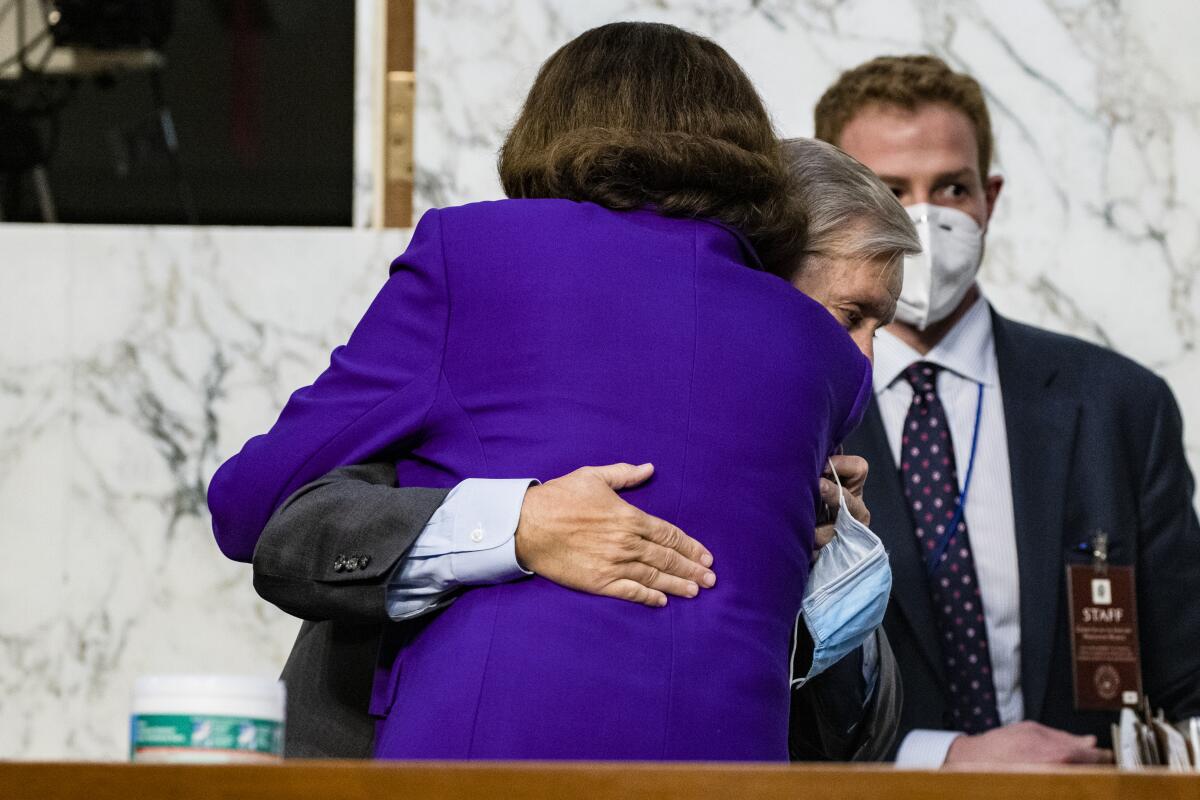Feinstein’s conduct at the Amy Coney Barrett hearing wasn’t a firing offense

- Share via
Political circles have been buzzing with speculation about Sen. Dianne Feinstein ever since she announced Monday that she won’t seek to remain the leading Democrat on the Judiciary Committee.
At the time, she said she wanted to focus more on the “existential threats” of wildfire and drought. But something else apparently influenced her decision: criticism by fellow Democrats and liberal activists of her performance during and after the confirmation hearings of Supreme Court Justice Amy Coney Barrett.
Feinstein’s sin in the eyes of the activists was that she congratulated the committee chairman, Republican Sen. Lindsey Graham of South Carolina, on how he conducted the Barrett confirmation process, calling it “one of the best set of hearings that I’ve participated in.” She also (gasp!) shared a hug with Graham at the end of the proceedings.
As my colleague Jennifer Haberkorn reported Monday, some rank-and-file Democrats had raised the issue of Feinstein’s position on the committee with Senate Minority Leader Charles E. Schumer (D-N.Y.), and Schumer had a “very serious” conversation with Feinstein. Now she is giving up her role as the panel’s leading Democrat.
Feinstein’s alleged offense was undercutting the Democrats’ objection to the legitimacy of a Supreme Court nomination at the end of President Trump’s term. But that’s a bum rap. Feinstein specifically objected to the timing of the nomination and voted against the nominee.
Moreover, she participated fully in the Democrats’ concerted (if misleading) strategy of arguing that the main issue in Barrett’s confirmation for a lifetime term was how she would vote on a challenge to the Affordable Care Act that the high court was scheduled to hear in early November. As for her praise for Graham’s conduct of the hearing, it’s a fact that — knowing the outcome was assured — Graham was willing to allow the Democrats to use the hearings as political theater about healthcare. Feinstein’s praise of Graham was innocuous.
Feinstein can be fairly criticized in connection with Barrett’s ascent to the Supreme Court, but it has nothing to do with the way she performed during Barrett’s confirmation this year. In 2017, when Barrett was nominated for a seat on the U.S. 7th Circuit Court of Appeals, Feinstein’s clumsy comments about the nominee’s religious “dogma” made Barrett a heroine for religious conservatives. Trump later added Barrett’s name to his list of potential Supreme Court nominees.
To be fair, the reaction to Feinstein’s decision to step down as the leading Democrat on the Judiciary Committee is a reminder that Feinstein’s critics aren’t upset only by her kind words for Graham.
In exulting over Feinstein’s decision, Brian Fallon of the progressive pressure group Demand Justice said: “This was a necessary step if Democrats are ever going to meaningfully confront the damage Donald Trump and Mitch McConnell have done to the federal judiciary. Going forward, Democrats on the Senate Judiciary Committee must be led by someone who will not wishfully cling to a bygone era of civility and decorum that Republicans abandoned long ago.”
The reference to Feinstein’s allegiance to a “bygone era of civility” apparently relates to her past support for a tradition under which a senator, by refusing to return a blue slip of paper, could block consideration of a judicial nominee from her home state.
During the Trump administration, Senate Republicans moved away from the blue-slip practice. Liberal activists had worried that if Biden was elected and Democrats regained control of the Senate, Feinstein as chair of the committee might allow home-state Republican senators to block Biden judicial nominees. (In September, after some confusing remarks by Feinstein, her office issued a statement saying that she had made no definitive commitment on how she would handle the blue-slip issue if she chaired the Judiciary Committee.)
Demand Justice, which wants to add four seats to the Supreme Court, doesn’t think much of civility and decorum, but it’s hard to fault Feinstein for believing that those qualities still have their uses. She may be vindicated if Republicans retain control of the Senate and Biden and Senate Democrats need to court them.
More to Read
A cure for the common opinion
Get thought-provoking perspectives with our weekly newsletter.
You may occasionally receive promotional content from the Los Angeles Times.










